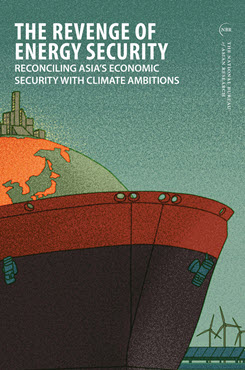Essay in NBR Special Report 105
Japan’s Energy Security Strategy: The Implications of Fukushima and Ukraine
This essay examines how the 2011 Fukushima Daiichi nuclear disaster, the 2022 Russian invasion of Ukraine, and evolving stakeholder groups’ energy resilience priorities are combining to influence the Japanese government’s current energy security strategy.
EXECUTIVE SUMMARY
MAIN ARGUMENT
The Fukushima disaster and the war in Ukraine have challenged Japan’s energy resource availability and affordability, prompting a shift in the balance of liquefied natural gas (LNG), coal, and nuclear power in Japan’s domestic electricity supply. Energy system resilience priorities held by the Japanese government, electric utilities, and the general public also have influenced domestic policy responses and supply strategies. These new initiatives, which include the Economic Security Promotion Act, the 6th Strategic Energy Plan, the Green Transformation (GX) strategy, the GX Decarbonization Electricity Act, the Asia Zero Emissions Community initiative, and other policies and programs, face external and domestic challenges to their focus on balancing energy security, economic, and decarbonization priorities. Food-energy-water-climate interconnections exacerbate these challenges, but potential avenues for international collaboration toward solutions exist. These solutions include clean technology financing and development, continued development of advanced nuclear technologies, enhancements of nuclear safety, nuclear waste disposal solutions, purple hydrogen development, energy storage innovations, sharing of energy efficiency best practices, and responses to supply chain uncertainties for fuels and critical minerals and materials.
POLICY IMPLICATIONS
- Energy shocks and stakeholders’ energy system resilience priorities will continue to combine to influence Japan’s energy security strategies.
- Recognition of the nexus of food, energy, water, and climate issues in Japan’s energy security strategies supports holistic policies and promotes domestic and international collaboration on energy resource diversification, innovation, and clean energy transitions.
- Such integrative policies can include development of synergistic frameworks for energy, food, and water safety and security to address cross-sectoral risks.
Jennifer F. Sklarew is an Assistant Professor in the Environmental Science and Policy Department at George Mason University.



 The Revenge of Energy Security: Reconciling Economic Security with Climate Ambitions in the United States and Asia
The Revenge of Energy Security: Reconciling Economic Security with Climate Ambitions in the United States and Asia
